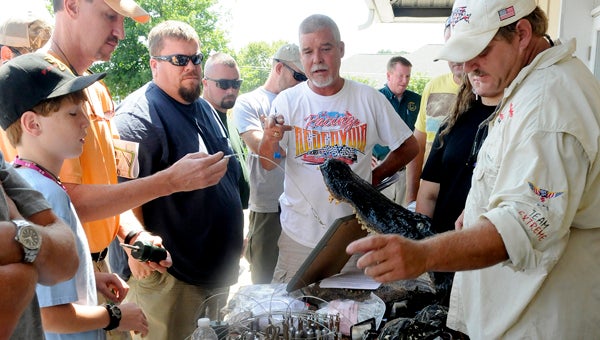Hunters have small window to hunt the biggest gator they can find
Published 7:00 pm Friday, June 29, 2018

- Licensed alligator hunters for the West Central zone look through equipment from an expert vendor and hunter. in 2012. -- Ashley Johnson
Alligator hunting season in Alabama is quickly approaching and registration for tag applications is already underway.
Experienced anglers, rookies and spectators are in anticipation of another season trying to see who can bring in the biggest gator.
“It’s real popular,” Alabama Wildlife and Freshwater Fisheries Division (AWFFD) Sgt. Alan Roach said. “I remember one year they had 6,000 people apply to get a tag.”
According to Roach, people come to Alabama to hunt the giant reptiles for the thrill of it. An average adult alligator can weigh more than 800-pounds.
“They see them on the river and think it would be an exciting thing to do,” Roach said. “They’re big, dangerous and kind of the same reason they’d want to go on a safari in Africa. There is a combination of excitement and a little danger, and only so many people get to go.”
Registration opened at the start of June and will remain open until July 11. Only residents and lifetime hunting license holders of the state of Alabama that are at least 16-years-old are permitted to apply for an alligator possession tag.
Non-residents can participate as hunting assistants, but everyone involved in the hunt must possess a valid Alabama hunting license.
Hunters can only register for a tag through the Alabama Department of Conservation and Natural Resources (ADCNR) website at www.outdooralabala.com/alligators/alligator_hunt_registration. There is a registration fee, but no charge for the possession tag. Only one application will be allowed per person per zone.
After the registration period ends, the drawings for each area will be held on July 11. The drawn hunters will have a week to claim their tag before the tag is awarded to the next name on the drawing list.
Each applicant will be required to attend and complete the two-hour Alligator Training Course provided by the Wildlife and Freshwater Fisheries Division (WFFD). Hunters selected for the West Central zone can attend the course at the Alabama Farmer’s Co-op in Selma. Once completed, applicants will be eligible to receive an alligator possession tag.
Dallas County has private and public waters where gator hunting is permitted. The West Central zone will have 50 non-transferable possession tags drawn. The hunting season opens at sunset on Aug. 9 until sunrise on Aug. 12, and once again from sunset on Aug. 16 through sunrise on Aug. 19.
“A lot of them will go out early to scout because they all want the biggest one they can get,” Roach said. “The person can take as many helpers with him as he wants to as long as they purchase a hunting license, but it’s one person, one tag and one gator.”
Capture methods are restricted to hand-held snares, snatch hooks, harpoons and bowfishing equipment. The alligator must be captured and brought adjacent to the boat, bank or dick prior to killing it.
Alligators caught in the West Central zone must return the harvested alligator to the WFFD check station at Roland Cooper State Park between 8 p.m. and 7 a.m. on the day of the hunt.
For more information, visit www.outdooralabama.com.
“A lot of people show up down there in Camden where the gators come in to be measured,” Roach said. “It’s a real big deal to see who catches the biggest one every year.”
Since measurements have been kept on gator hunts, the two largest gators caught in the nation were caught in the West Central zone according to Roach.
The largest was captured by the Stokes family on the Alabama River on Aug. 6, 2014, and the 15-foot-9-inch 1,011.5-pound gator is on display at the Mann Wildlife Learning Museum in Montgomery.
“They were both caught down in the Wilcox County part of the river, but in the same gator zone that Selma is in,” Roach said. “Everybody is after the world record because it came from this zone.”





